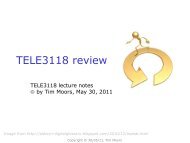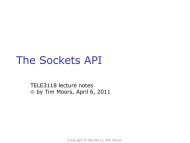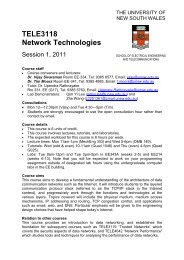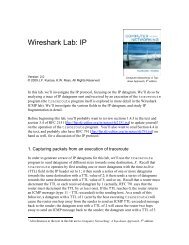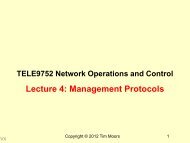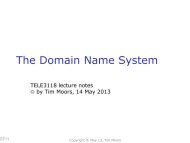TELE9752 Network Operations and Control - EE&T Lecture Notes
TELE9752 Network Operations and Control - EE&T Lecture Notes
TELE9752 Network Operations and Control - EE&T Lecture Notes
Create successful ePaper yourself
Turn your PDF publications into a flip-book with our unique Google optimized e-Paper software.
1 Aims<br />
<strong>TELE9752</strong> <strong>Network</strong> <strong>Operations</strong> <strong>and</strong> <strong>Control</strong><br />
Session 2, 2012<br />
Course Outline<br />
The aim of <strong>TELE9752</strong> is to develop student underst<strong>and</strong>ing of how telecommunication<br />
networks are operated <strong>and</strong> controlled. That is, whereas other networking courses focus<br />
solely on the technologies that enable users to transfer information across a network (e.g.<br />
TELE3118 focuses on network protocols, <strong>and</strong> TELE9751 focuses on the design of network<br />
equipment), this course considers how such technologies can be operated <strong>and</strong> controlled<br />
by people concerned with providing network services (e.g. network administrators).<br />
1.1 Learning outcomes<br />
By the end of this course, students should be able to:<br />
• Describe the functional areas of network management in terms of the problems that<br />
arise in each functional area <strong>and</strong> in terms of the technologies that are used to<br />
address those problems.<br />
• Construct Management Information Bases that describe the information used to<br />
manage typical network protocols.<br />
• Be familiar with st<strong>and</strong>ards for network operations <strong>and</strong> control.<br />
• Access <strong>and</strong> assess recent developments in network operations <strong>and</strong> control<br />
research.<br />
This course contributes to the following UNSW Graduate Attributes:<br />
• the skills involved in scholarly enquiry;<br />
• an in-depth engagement with the relevant disciplinary knowledge in its<br />
interdisciplinary context;<br />
• <strong>TELE9752</strong> focuses on the discipline of network operations <strong>and</strong> control, <strong>and</strong> its<br />
contexts of broader IT <strong>and</strong> business management, network protocols, <strong>and</strong><br />
engineering methods.<br />
• the capacity for analytical <strong>and</strong> critical thinking <strong>and</strong> for creative problem<br />
solving;<br />
• the ability to engage in independent <strong>and</strong> reflective learning;<br />
• <strong>TELE9752</strong> fosters critical thinking <strong>and</strong> independent <strong>and</strong> reflective learning by<br />
rewarding, through its assessment criteria, students who explicitly articulate<br />
questions <strong>and</strong> answers about course material.<br />
• Information Literacy – the skills to locate, evaluate <strong>and</strong> use relevant information;<br />
• the skills required for collaborative <strong>and</strong> multidisciplinary work;<br />
• the skills of effective communication.<br />
• <strong>TELE9752</strong> includes group research about a research paper in the area of<br />
<strong>Network</strong> <strong>Operations</strong> <strong>and</strong> <strong>Control</strong>. This activity, in particular, will develop student<br />
capacity to locate, evaluate <strong>and</strong> use relevant information, to collaborate with<br />
peers, <strong>and</strong> to effectively communicate.<br />
1
1.2 Syllabus<br />
From the UNSW Course H<strong>and</strong>book<br />
[http://www.h<strong>and</strong>book.unsw.edu.au/postgraduate/courses/2012/<strong>TELE9752</strong>.html]:<br />
This course introduces the principles, techniques, <strong>and</strong> tools used for the management<br />
of modern communication networks such as the Internet. The five major functional<br />
areas of network management are discussed: configuration management for<br />
configuring the hardware <strong>and</strong> software on network elements, performance management<br />
for measuring <strong>and</strong> controlling network performance, fault management for detecting <strong>and</strong><br />
responding to fault conditions in the network, security management for securing <strong>and</strong><br />
controlling access to resources in the network, <strong>and</strong> accounting management for tracking<br />
<strong>and</strong> logging network usage.<br />
2 Context<br />
Programs: <strong>TELE9752</strong> is part of the Telecommunications Specialisation Area of multiple<br />
programs (program codes in parenthesis):<br />
• Master of Engineering Science (8538)<br />
• Master of Engineering Science Extension (8539)<br />
• Graduate Diploma of Engineering Science (5338)<br />
It may also be chosen as an elective in other programs, e.g. the Bachelor of Engineering in<br />
Telecommunications program (code 3643) <strong>and</strong> the Doctor of Philosophy program (code<br />
1640).<br />
Several other UNSW courses relate to <strong>TELE9752</strong>:<br />
Prerequisites: Background from an introductory networking course like UNSW's TELE3118<br />
Complementary: TELE3119 covers network security in more depth, whereas this course<br />
only covers securing of network management systems <strong>and</strong> management of security<br />
systems. TELE4642 considers network performance in depth. TELE9751 covers the<br />
internal design of the devices that this course considers the control of, <strong>and</strong> TELE9756<br />
considers advanced aspects of networking.<br />
Following: <strong>TELE9752</strong> is not a prerequisite for any other UNSW course, although students<br />
may wish to follow <strong>TELE9752</strong> with complementary courses.<br />
Old: TELE9303 <strong>Network</strong> Management is the predecessor of <strong>TELE9752</strong>.<br />
<strong>TELE9752</strong> is worth 6 Units of Credit (UOC). “The normal workload expectations of a<br />
student are approximately 25 hours per Semester for each UOC”<br />
[https://my.unsw.edu.au/student/atoz/UnitsOfCredit.html]<br />
The design of this course has been informed by the following publications:<br />
• M. Ulema: “Design <strong>and</strong> implementation of a network management course for<br />
undergraduate information systems students”, Information Systems Education<br />
Journal<br />
• B. Elenbogen: “Computer network management: theory <strong>and</strong> practice”, ACM<br />
SIGCSE Bulletin, 31(1):119-21<br />
• R. Minch <strong>and</strong> S. Tabor: “Teaching <strong>Network</strong> Management H<strong>and</strong>s-On: Experiences<br />
with a Student-Run Internet Service Provider”, Decision Line, 32(3):4-6<br />
2
3 Teaching staff<br />
The <strong>Lecture</strong>r for this course is Dr Tim Moors. http://www2.eet.unsw.edu.au/~timm/<br />
4 Delivery<br />
Classes will be held on Tuesday evenings from 6-9pm in room 418 of the EE&T building.<br />
The <strong>Lecture</strong>r encourages you to participate during lectures by asking <strong>and</strong> answering<br />
questions.<br />
5 Course materials<br />
The prescribed textbook for this course is<br />
A. Clemm: <strong>Network</strong> Management Fundamentals, Cisco Press, 2006<br />
This textbook will be supplemented by Recommended Reading which will available<br />
through the course web page. PDF copies of lecture notes will also be available through<br />
the course web page.<br />
6 Communication channels<br />
Email: You can email the <strong>Lecture</strong>r of this course at t.moors AT unsw.edu.au. Such emails<br />
must include the phrase “tele9752” in the subject line. Email can be used for<br />
administrative matters, but technical questions arising from the content of the course<br />
should be raised orally during consultation time.<br />
Consultation: The <strong>Lecture</strong>r is available for consultation during breaks between lectures on<br />
lecture nights, <strong>and</strong> in his office (341 of the EE&T building) only at consultation times which<br />
are to be announced. Note: To assist in making the course wiki a repository of<br />
questions <strong>and</strong> answers about the course, if you wish to ask a question during<br />
consultation time then you must first post it on the course wiki before the <strong>Lecture</strong>r<br />
can discuss it with you during consultation time.<br />
Notifications to students: Notifications to students about this course will be made orally<br />
during lectures, may be posted on the course web page (which you are expected to check<br />
at least once per week), <strong>and</strong> may be emailed to your student email address, e.g.<br />
z1234567@zmail.unsw.edu.au (which you are expected to check at least once per day<br />
<strong>and</strong> to maintain so that messages sent to your student email address do not bounce).<br />
Course web page: http://subjects.ee.unsw.edu.au/tele9752/<br />
Blackboard: This course will use Blackboard for disseminating marks, <strong>and</strong> submitting<br />
assignments <strong>and</strong> evaluations. UNSW's Blackboard system can be accessed<br />
through http://lms-blackboard.telt.unsw.edu.au/. If you cannot access Blackboard, then see<br />
http://telt.unsw.edu.au/blackboard/content/default.cfm?ss=0 for support.<br />
Wiki: This course will use, <strong>and</strong> develop a wiki at http://tele9752.wikia.com. By editing<br />
Wikia, you agree to license any text you add under the Creative Commons Attribution-<br />
Share Alike License 3.0 (Unported).<br />
3
7 Schedule<br />
A tentative schedule for <strong>TELE9752</strong> is:<br />
Week Topic<br />
1 <strong>Network</strong> Management Systems<br />
2 Revisiting protocol stacks in context of management<br />
3 Structuring & presenting management information (SMI, OIDs, MIBs, ASN.1, BER)<br />
4 Communicating management information (SNMP, syslog)<br />
5 Mid-session exam<br />
6 Remote Monitoring (RMON)<br />
7 Fault Management: Dependability <strong>and</strong> Event correlation<br />
8 Security Management<br />
9 Configuration management<br />
10 Accounting management<br />
11 Performance management<br />
12 Student presentations on advanced topics<br />
The first half of the course focuses on the information <strong>and</strong> protocols involved in <strong>Network</strong><br />
<strong>Operations</strong> <strong>and</strong> <strong>Control</strong>, while the second half focuses on the five functional areas of NOC<br />
(FCAPS: Fault, Configuration, Accounting, Performance, <strong>and</strong> Security management).<br />
8 Assessment methods <strong>and</strong> tasks<br />
8.1 Synopsis<br />
Weighting Task Due date<br />
70% Examinations<br />
30% Mid-session exam in week 5<br />
40% Final exam in Examinations Period<br />
20% Assignments<br />
10% Exercise end of week 12<br />
10% Wiki assignment end of week 8 to receive<br />
descriptive feedback<br />
end of week 12 to<br />
receive marks<br />
10% Group research in week 12 class<br />
10% extra Bonus for course<br />
improvement<br />
8.2 Examinations<br />
before Final exam<br />
The bulk (70%) of the assessment will take the form of two closed-book examinations.<br />
The mid-session exam, held in week 5, is intended to give you timely feedback about your<br />
individual performance.<br />
4
If you require special consideration for an examination, then follow the procedures<br />
described at https://my.unsw.edu.au/student/atoz/SpecialConsideration.html . Pay<br />
particular attention to the need to apply within 3 days of the date of the examination for<br />
which you seek special consideration, <strong>and</strong> note that any alternate assessment given to<br />
recipients of special consideration may be conducted orally <strong>and</strong> will be no easier than the<br />
original assessment. Any supplementary final exam will likely be held in week 18 (6 weeks<br />
after the last week of session), <strong>and</strong> you should particularly consider this if you are planning<br />
to travel. The school policy for offering supplementary exams is described at<br />
http://scoff.ee.unsw.edu.au/information/AcademicIssues.htm#Supplementary<br />
Final Exam Paper Inspection Session: A Final Exam Paper Inspection Session will be held<br />
after results are released (the course web page will provide the exact date by the time that<br />
results have been released). If you wish to inspect your Final Exam paper during this<br />
Inspection Session, then you must tell the <strong>Lecture</strong>r via email within one week of the<br />
release of results.<br />
8.3 Exercise<br />
In the exercise, you will use the concepts (e.g. of management information <strong>and</strong> protocols)<br />
taught in the course to operate <strong>and</strong> control real network equipment. The exercise adds a<br />
particularly practical aspect to the course.<br />
8.4 Wiki<br />
In the Wiki assignment, you will create wiki pages that summarise the main concepts in<br />
this course <strong>and</strong> extend the wiki to cover other relevant topics that interest you. The wiki<br />
explicitly requires you to link concepts to each other <strong>and</strong> to concepts that are covered<br />
outside of this course.<br />
8.5 Group research<br />
The final 10% of the assessment will be for a group activity about a research paper in the<br />
area of <strong>Network</strong> <strong>Operations</strong> <strong>and</strong> <strong>Control</strong>. The output of the activity will take the form of a<br />
presentation to be made in class in week 12 <strong>and</strong> a wiki page about the research paper.<br />
The intention of this assessment item is to develop skills in learning about the latest<br />
advances in <strong>Network</strong> <strong>Operations</strong> <strong>and</strong> <strong>Control</strong>, while also developing group work <strong>and</strong><br />
communication skills. Your mark will reflect your own contribution to your group, as well as<br />
the output of your group as assessed by both the lecturer <strong>and</strong> class.!!! feedback!!!<br />
8.6 Bonus for course improvement<br />
Students are encouraged to propose realistic ways to improve the course, <strong>and</strong> may be<br />
rewarded for such proposals by receiving a bonus mark (that adds to the 100% potential<br />
marks from other assessment tasks) of up to 10%. Such contributions (be they questions,<br />
answers, comments, pointers to useful course material, etc) must be made before the<br />
Final Exam.<br />
5
8.7 Assessment requirements<br />
Material submitted for assessment must:<br />
� Be submitted before the deadline<br />
� Be original work by the student <strong>and</strong> not include plagiarism - see Section 10.1<br />
� Be self-contained in that it can be fully understood independent of course materials<br />
(e.g. lecture notes)<br />
� Demonstrate skills <strong>and</strong> knowledge that are developed by the course.<br />
9 Other matters<br />
9.1 Academic Honesty <strong>and</strong> Plagiarism<br />
Plagiarism is the unacknowledged use of other peoples work, including the copying of<br />
assignment works <strong>and</strong> laboratory results from other students. Plagiarism is considered<br />
a serious offence by the University <strong>and</strong> severe penalties may apply. You are expected to<br />
be familiar with what plagiarism is, <strong>and</strong> how to avoid it:<br />
http://www.lc.unsw.edu.au/plagiarism . Students who have been found to have plagiarised<br />
in a <strong>TELE9752</strong> assessment item may have the maximum number of marks for that<br />
assessment item subtracted from their overall course mark, e.g. -10% if you have been<br />
found to have plagiarised in your wiki assignment.<br />
9.2 Administrative Matters<br />
On issues <strong>and</strong> procedures regarding such matters as special needs, equity <strong>and</strong><br />
diversity, occupational heath <strong>and</strong> safety, enrolment, rights, <strong>and</strong> general expectations<br />
of students, please refer to the School policies: http://scoff.ee.unsw.edu.au/<br />
9.3 Continual Course Improvement<br />
Students are advised that the course is under constant revision in order to improve the<br />
learning outcomes of its students. Students are encouraged (in part by the potential for a<br />
bonus mark of up to 10%) to forward any feedback (positive or negative) on the course to<br />
the <strong>Lecture</strong>r. An example of the impact of student comments on course improvement is<br />
the introduction in 2012 of an exercise in which you will apply network management<br />
techniques <strong>and</strong> technologies to a testbed of real equipment, which comes in response to<br />
student requests for more “practical” components for the course.<br />
6


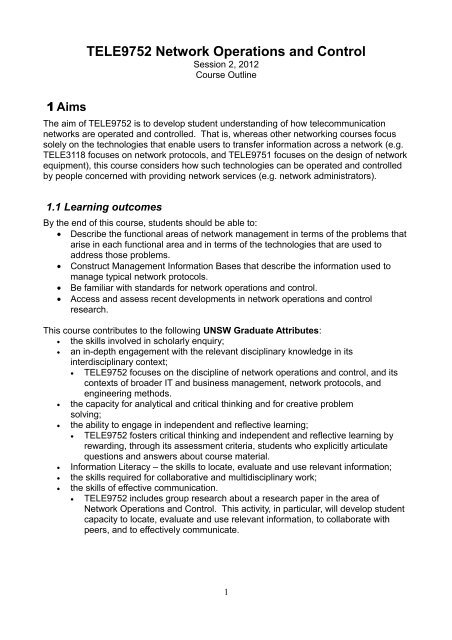
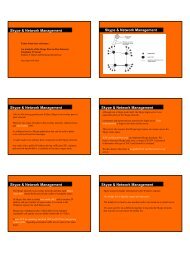
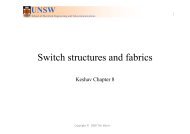
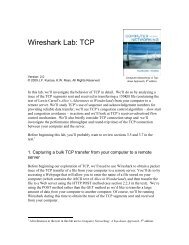
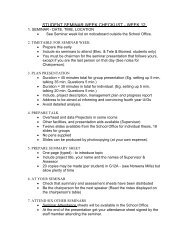
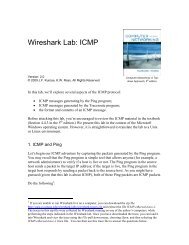
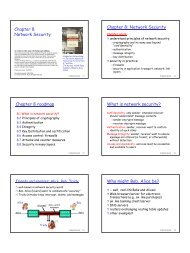
![TELE 3118: Network Technologies: Mini-project [10 points]](https://img.yumpu.com/34121935/1/190x245/tele-3118-network-technologies-mini-project-10-points.jpg?quality=85)
